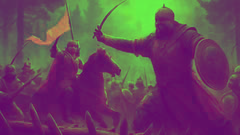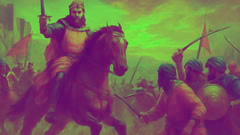Introduction
In the rolling hills and wild forests of medieval France, where rivers cleave through ancient land and castles rise like sentinels against the clouds, the very air seems heavy with the echoes of old songs. Here, among the mists and stone walls, legends are forged not from idle dreams, but from the iron will of men who shape history with sword and oath. This is the world of William of Orange—Guillaume d’Orange as the chansons call him—a hero whose life is etched into the heart of France, inseparable from the age of Charlemagne. His tale is one of unwavering loyalty, courage tested on battlefields where the fate of Christendom hangs by a thread, and sacrifice measured not by what is lost, but by what is preserved: honor, kin, and the land itself. William was born in an era where Saracen banners threatened the southern borders, and the call to arms was the language of survival. He grew up at the knees of warriors, learning the weight of chainmail before he learned to read. Yet even in youth, the fire of destiny burned behind his calm eyes. His uncle, the great Charles—the Emperor Charlemagne—entrusted him not only with armies, but with the hope that France could withstand the tide of invaders who sailed from far-off shores, seeking conquest beneath strange gods. From the fortified city of Orange to the wild Pyrenean passes, William’s life became an endless march from siege to siege, each victory bought with sweat and grief. But his story is not only of war. It is of moments stolen by moonlight, prayers whispered in candle-lit chapels, the laughter of comrades around smoky campfires, and the bond of family that never yields, even as kingdoms rise and fall. In these pages, you will find no invulnerable demigods or gilded paladins untouched by sorrow. William’s courage is human—raw, flawed, and real. He doubts, he bleeds, he loses and endures. Yet in every trial, his spirit refuses to yield. His chanson—the song of his deeds—resounds through the centuries as a testament to the kind of heroism that builds nations and inspires hope. This is the legend of William of Orange, sung anew for those who still believe that one person’s valor can change the world.
The Oath of Loyalty: William’s Rise in Charlemagne’s Court
In the candlelit halls of Aix-la-Chapelle, Charlemagne’s court buzzed with the business of empire. Lords and bishops crowded the mosaic-floored chambers, their voices weaving a tapestry of intrigue and ambition. Among these figures, young William stood apart. His father, Aymeri of Narbonne, was a legend in his own right—one of the Emperor’s fiercest champions. Yet William was not content to rest in the shadow of his lineage. Every morning, he trained with the swordmasters, his breath forming clouds in the chill dawn. The clang of steel on steel echoed across the courtyards as he sparred with Roland and Olivier, those other famous paladins whose names would soon fill their own songs.

Charlemagne watched with a keen eye, weighing the mettle of the youth before him. The Emperor was a mountain of a man, beard streaked with silver and voice as deep as the bell towers that tolled across his lands. One evening, after a feast that saw laughter and jesting turn to somber news from the south—reports of Saracen raids in Septimania—the Emperor summoned William. The young knight knelt before the throne, the flicker of torches casting long shadows behind him. "Swear to me, nephew," Charlemagne intoned, "that you will defend the borderlands until your last breath, for the sake of Christendom and the peace of our realm." Without hesitation, William pressed his lips to the Emperor’s ring. "By my honor and by the bones of my ancestors, I swear," he replied. In that moment, the course of his life shifted irrevocably. The nobles murmured approval; even those who doubted the upstart’s youth felt the spark of something rare.
William’s first true test came swiftly. The city of Orange, his own inheritance, was beset by Saracen forces led by King Desramé, a cunning and ruthless commander. The invaders swept through the vineyards and olive groves, their banners black as raven wings against the morning sky. William’s heart hammered as he rode out at the head of his household knights. The people of Orange—merchants, bakers, children—watched anxiously from behind shuttered windows. In the stony fields outside the city, William met Desramé beneath a tattered white flag. "Surrender, Frank," sneered the Saracen king, his eyes gleaming with contempt. "Your walls are old, your men few. Bow now and I will spare you." William’s reply was simple: he drew his sword and held it aloft, letting the sunrise glint from its polished blade. "Orange stands for France. We will not yield."
The siege that followed was brutal. Desramé’s catapults battered the walls by day; his archers unleashed fire arrows by night. Yet William refused to cower. He led sorties under cover of darkness, setting fire to enemy siege engines and freeing captives. He walked among his people, sharing bread and water, listening to their fears, giving what comfort he could. At dawn on the seventh day, a rumor swept through the Saracen camp: reinforcements were coming. The rumor was a ruse—William’s own doing, spread by spies and loyal merchants—but it worked. Desramé’s men faltered. Sensing weakness, William led a charge from the city gates, catching the invaders off guard. The clash was fierce and desperate; steel rang out over cries of pain and the whinnying of terrified horses. In the end, Desramé was captured, and his army scattered. The city rejoiced. For the first time, William tasted the bitter-sweetness of victory—knowing each triumph left scars invisible to the world.
Battle at the Pass: William Defends France
No sooner had Orange been secured than news arrived of a greater threat. Across the Pyrenees, a vast Saracen host gathered—drawn by tales of easy conquest and the promise of gold. Their leader, the fearsome Emir Taïb, had sworn an oath to drive the Franks into the sea. Charlemagne, beset by rebellions in Lombardy and unrest among his vassals, dispatched William with a modest force to hold the mountain passes. "Delay them," the Emperor commanded. "Buy me time, and France will owe you a debt beyond measure."

The road to Roncesvaux wound through forests thick with pine and mist. William’s band—little more than two hundred knights and men-at-arms—moved quietly beneath ancient trees, every sense alert for the snap of a twig or the glint of a spear in the undergrowth. Villagers fled before the invaders’ advance, and everywhere the scent of smoke hung in the air. At the narrowest point of the pass, William chose his ground. He ordered trenches dug and barricades raised from fallen logs. His men grumbled—some had never seen real battle—but William walked among them, sharing rough bread and his own flask of wine. "We hold not for glory," he told them, "but for the farms and families beyond these hills. Remember them when fear would have you run."
The dawn before battle broke chill and silent. Then, from the gloom, came the sound of drums. The Saracen host marched in columns, their armor gleaming like fish scales in the morning light. Banners fluttered—green, gold, and crimson—and their numbers seemed endless. William’s heart clenched as he watched; but he would not show fear. He rode along the line, his orange banner snapping in the wind. "Stand firm!" he cried. "Here is where we hold them."
The first clash was thunderous. Arrows darkened the sky; pikes bristled like a hedge of death. William led charge after charge, his voice hoarse with command. Time lost all meaning—a blur of sweat and blood, steel on steel, men falling and rising again. Three times the Saracens breached the barricades, and three times William’s knights hurled them back. At midday, Emir Taïb himself rode forth, challenging William to single combat. The two champions met amid the carnage, watched by friend and foe alike. Taïb was a giant, his scimitar swift and cruel. William ducked and weaved, his sword flashing in the sun. At last, with a prayer whispered to Saint Michael, he struck—his blade biting through armor to lay the Emir low.
The Saracen lines wavered, then broke. William’s men gave chase, harrying the retreating foe down the slopes. When silence finally returned, the pass was littered with broken shields and spent arrows. Of William’s two hundred, barely eighty survived—but they had held. Word spread like wildfire: the hero of Orange had turned back an army with a handful of faithful men. In distant Aachen, Charlemagne wept with pride.
The Sacrifice at Orange: Family, Loss, and Triumph
With victory at the pass still fresh in memory, William returned to Orange—hoping for respite and the comfort of home. Instead, he found a city trembling beneath a new threat. Desramé’s brother, Abderame, had returned with a fresh host, burning with vengeance for his sibling’s defeat. This time, the Saracens stormed not only with arms but with cunning—seizing hostages, sowing discord among Orange’s defenders, and poisoning wells in the countryside.

William’s family became the focus of Abderame’s wrath. His wife, Guibourc—wise and proud, herself the daughter of a noble Frankish house—was taken captive during a daring raid on the city’s outskirts. Their young son hid beneath chapel stones as smoke curled over the rooftops. William’s heart twisted with fear and rage. He gathered his knights and stormed the Saracen camp under cover of darkness, risking everything to save those he loved. The rescue was chaos—a blur of flashing steel and shouted commands. William fought like a man possessed, cutting a path through Abderame’s personal guard. In the heart of the camp, he found Guibourc bound but unbroken, her eyes blazing with defiance.
Together they fled, pursued by Saracen horsemen through burning vineyards and moonlit groves. At last they reached Orange’s battered gates, where William’s men rallied for a final stand. Abderame unleashed his full fury, battering the city with fire and steel. Supplies ran low; hope flickered on the edge of despair. In those darkest hours, it was Guibourc’s courage that sustained them. She tended to wounded soldiers, organized rations, and reminded William that faith endures where swords fail.
On the eve of surrender, when all seemed lost, a miracle arrived. Charlemagne, spurred by news of William’s plight, led a relief force across the Rhône. The Emperor’s banners appeared at sunrise, their golden eagles shimmering in the mist. The Saracens, caught between hammer and anvil, fell into disarray. William seized the moment, leading a sally from the gates that shattered Abderame’s lines. In the aftermath, as the city celebrated and wounded were tended, William knelt in the ruins of his chapel—giving thanks not for victory alone, but for the lives spared by his sacrifice.
Loss was ever the price of heroism. Friends had fallen; scars would never heal. Yet the legend of William of Orange grew brighter for what he had endured, not what he had escaped. His chanson—his song—echoed in the hearts of his people long after the fires died down.
Conclusion
Long after the banners have been folded and the clangor of swords has faded into silence, the story of William of Orange endures. His was a life shaped by trials—each battle not only a test of strength but of faith and love. William’s victories were never easy; he bled for every inch of France he saved and wept for each friend lost to the unending tide of war. Yet his courage—tempered by sacrifice and sustained by those dearest to him—became the bedrock upon which legends are built. In later years, as Charlemagne’s empire matured and new threats rose on distant horizons, people would gather by hearth or chapel to sing of William’s deeds. Children learned his name alongside those of Roland and Olivier. His story offered more than entertainment; it gave hope that ordinary men, through loyalty and heart, could defy even the darkest odds. Today, his chanson remains a living bridge between past and present—a melody of resilience and unity that continues to inspire all who seek to stand for what is just and true.













